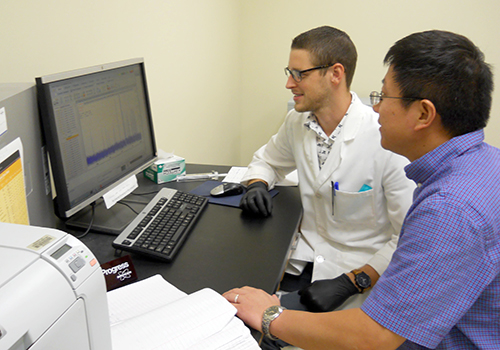Pharmacology and Toxicology: Graduate Program Goals

The mechanisms by which chemicals interact with biological systems unify the diverse research themes within the Graduate Program in Pharmacology and Toxicology. We are particularly interested in advancing our basic understanding of cancer biology, environmental toxicology, and drug abuse. To pursue these questions, we capitalize on recent advances in chemistry, genomics and proteomics, molecular and cellular biology, neuroscience, structural biology and psychopharmacology. Complementing many of these areas of interest are strong cores in mass spectrometry, protein chemistry, chemical synthesis, bioinformatics and animal behavior, especially as related to drug abuse. Exciting opportunities for research and advanced education await students in these basic areas of investigation.
The Pharmacology and Toxicology Graduate Program is geared toward scholars seeking a PhD and accommodates those interested in a combined MD/PhD program. Our ultimate purpose is to train researchers to:
- ask fundamental questions concerning important biochemical, cellular, and behavioral processes;
- explore how these processes are altered by disease, development, aging, drug use, and toxin exposure,
- discover how these untoward processes can be prevented or treated by drugs,
- to synthesize new chemical entities with therapeutic potential and discover new methods by which these can be delivered
A particular strength of our program is the broad spectrum of biological systems studied. This will provide rich training opportunities for the next generation of scientists interested in disease and drug mechanisms, as well as drug targets and delivery.
This program boasts graduates in various responsible positions within academia, research institutes, government laboratories, and industry. Current employment opportunities are especially bright for trainees with expertise in integrating information from molecular/cellular and whole-animal studies.
Our philosophy is centered on training students to achieve academic excellence, nurturing independent thinking, and stimulating early-stage participation in academic life. As part of the UTMB Quality Enhancement Plan, we support IPE2Practice, a forward-looking initiative designed to enhance student learning and prepare students to excel in interprofessional teams. Our curriculum includes 20 courses from the Basic Science curriculum, 4 laboratory rotations, and 18 Pharmacology & Toxicology graduate courses. Ad hoc seminars and grant writing courses are offered throughout the PhD Program and encouraged to elevate the quality of presentation and science dissemination skills of our students.
Finally, with unprecedented opportunities for new drug discovery and development resulting from the Human Genome Project, pharmacologists and toxicologists will remain in great demand. Their ability to translate fundamental principles of genomics and structural biology, biochemistry, and cell biology into new therapeutic approaches and, ultimately, into viable therapeutic molecules is pivotal to the future of biomedical science.